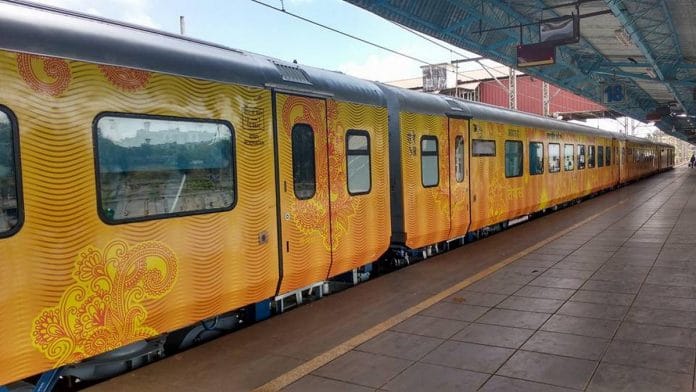New Delhi: In a major concession to private players, the Indian Railways has decided that there would be no overarching body to regulate tariffs or fares for private trains even as it left open the scope for the creation of such a body in the future.
In a corrigendum issued Wednesday when the Railways met private players for the second pre-bid meeting for the running of private trains, the Railways told the interested players, “There would be no fare regulation and the PTOs (Private Train Operators) shall have autonomy to determine tariffs/fares.”
As far as regulating prices is concerned, the Railways said competition in the market will ensure that the players do not overcharge.
“Indian transportation landscape is quite competitive and there is sufficient competitive tension in the market. PTO(s) are likely to compete with all modes of transport and not likely to operate in a monopolistic environment,” the Railways said.
“Accordingly, though PTO(s) will have autonomy to determine and levy fares, travellers would always have choice for alternative trains/modes of transport. Such competitive tension should address such risk of prohibitive pricing by PTO(s),” it added.
Moreover, the private players will have no control over the Indian Railways’ fares, which it will be free to reduce on its own. “There is no restriction on Indian Railways to reduce its existing fares.”
The Railways is looking for private players to operate passenger train services over 109 routes formed in 12 clusters across its network.
Also read: Railway officers resist ‘unilateral, shocking’ decision to end posting of bungalow peons
Excessive regulation will kill interest
The corrigendum is in contrast with the Railways’ claim so far that the fares will be regulated by a Rail Development Authority (RDA), which was approved by the Union Cabinet in 2017. In the context of private trains, it was said the RDA will perform a role similar to that of the Telecom Regulatory Authority of India (TRAI).
“There is no final decision as of now,” a railway spokesperson told ThePrint. “The whole point of pre-bid meetings is that you respond to the concerns of the private players… But what will be in the final tender will be the final decision on the issue.”
Sources in the Railways said since it is a new sector, which is just opening up, it is believed excessive regulation will deter private players from coming forward.
“The Railways would want a civil aviation kind of arrangement wherein prices are regulated through competition, and not a body,” said an official. “Moreover, in case of any cartelisation or predatory pricing, there is already the Competition Commission of India.”
If there are any complaints against the fares fixed by private players, however, the Railways will be empowered to look into them, the official added.
Also read: For these top Railways bosses, the train of jobs doesn’t stop even after retirement
The catch
Yet, the Railways has not ruled out the RDA’s involvement in price determination in the future.
“There is a possibility of a rail regulatory body being set up in India in the future to regulate various entities and their functions. Functions of such a regulator may include economic regulation. Any form of economic regulation may have impact on Project revenues,” the corrigendum said.
“Based on its objectives, MoR (Ministry of Railways) may consider clarifying that the Project would not be under oversight of the proposed regulator. This would provide clarity/certainty to interested bidders,” it added. “However, if MoR desires to have this Project under the oversight of regulator in future, provisions to this effect should be included.”
It gave the example of development of greenfield airports in Hyderabad and Bengaluru.
“For example, when the PPP projects for development and operations of greenfield airports at Hyderabad and Bangalore were awarded, India did not have an independent economic regulator. However, as Government of India had already envisaged setting up of the regulator, the Concession Agreement addressed the same,” it said.
Also read: PMO to ‘intervene’ in Rs 1,500 cr signalling project as tender cost becomes a red flag







Roads are with govt, cars/busses pay road tax and ply. Air slots are with govt, airlines pay govt fees and fly Similar rules should be with trains.
But we love our “poor” look we have preserved them for 100 years through govt policy.
Tribhuvan Darbari- It is a welcoming initiative with an objective to provide better facilities to the travelers. There are several benefits of privatization for example- confirmed tickets and faster trains for passengers. Trains would run faster and would be safer and provide more facilities. Reduction in maintenance cost of train coaches. It will also help reduce the railways’ loss. Currently, the railways make losses in passenger services. It will also provide revenue to railways for future operations. The private entity will pay the Railways fixed haulage charges, energy charges as per actual consumption and a share in gross revenue determined through the bidding process.
#TribhuvanDarbari #Tribhuvan_Darbari #Darbari_Tribhuvan #Railways #Privatisation #Tribhuvan #Darbari
Complete infrastructure remains the same – – number of tracks, signalling system. Requirements of maintaining distance between trains will remain the same as it is today, because the signal interlocking remains as it is today. So number of trains and frequency will remain more or less what it is today.
Private players will only ensure cleaner trains and hopefully better catering. BUT JUST FOR THESE TWO MARGINAL ADVANTAGES, Narendra Modi wants to give them the FREEDOM TO DECIDE THE FAIR?????
This, in a poor country, where majority of travelers are poor, IS CAPITALISM OF THE MOST DISGUSTING KIND.
This will give rise to TENDENCIES TO SABOTAGE the entire railway system. Like presently trains are violently intercepted only in Naxal areas, now they will get violently intercepted all over India. Thanks to a senseless do-gooder called Narendra Modi and his equally hawa-hawai Chamchas like that man Piyush Goel